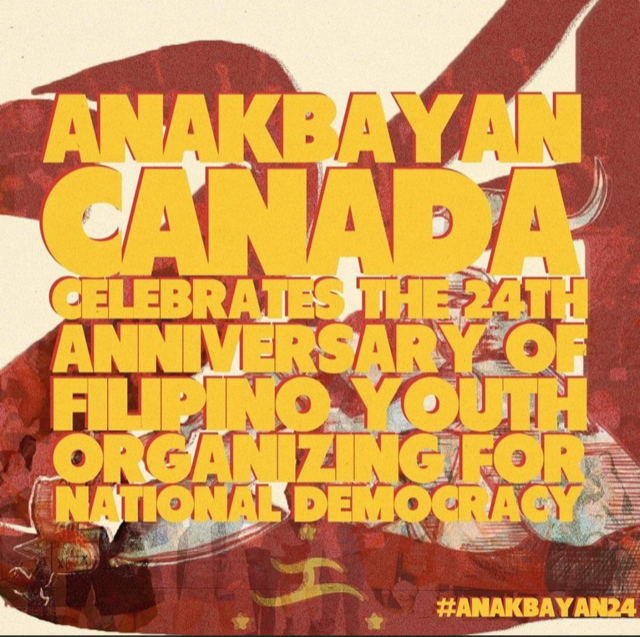
Statement from Anakbayan Canada
As 2022 comes to a close, Filipino youth in Canada remain firm in our commitment to supporting our fellow youth here in Canada and at home in the Philippines. Today, there is a worsening global socioeconomic crisis, the continuing COVID-19 pandemic, and the Marcos Jr. presidency’s crackdowns on activists, human rights defenders, land defenders, and journalists in the Philippines. We, the undersigned, condemn the human rights violations of the Marcos-Duterte tandem and support the struggle of Filipino youth activists around the world for liberation from exploitation and oppression.
In Canada, Filipino youth are disproportionately impacted by precarious working conditions, insufficient access to education, racism and its impacts on health and democratic participation in society, and family separation. There are almost 400,000 Filipino youth under 35 in Canada, making up 44% of the Filipino population in Canada. Across the country, Filipino youth have organized to protest food insecurity and low wages on university campuses, to support the liberation struggles of Palestinian and other oppressed youth, and to build community in sectors where we are underrepresented, such as in mainstream politics.
The root cause of our migration is the exploitative system in the Philippines. We leave our homeland because our parents have no economic opportunity in the Philippines, the postsecondary education system in the Philippines is devalued in the world market, or because our families face political repression and violence. Filipino youth — as international students, migrant workers, and the children of migrant workers — are expected to become breadwinners for our families in the Philippines because of the rotten economic and social system that makes it impossible to earn a living in our own homeland.
The Philippines is an import-dependent and export-oriented economy, meaning that we rely on exports of raw or minimally processed goods and migrant labour to support the economy, and we rely on imported manufactured goods for basic necessities. The position of the Philippines in the world economy makes us vulnerable to exploitation by big imperialist economies like the United States and Canada. Recently, both the US and Canada have made moves to advance their imperialist agendas in the Philippines. Last week, US VP Kamala Harris visited and met with Ferdinand Marcos Jr. and Sara Duterte in the Philippines with the aim of expanding US economic, political and military relations with the puppet regime. Here in Canada, investors get richer while Canadian mining companies perpetuate human rights and environmental violations in the Philippines.
Marcos Jr. has only exacerbated these problems. He has followed in his father’s footsteps by favouring foreign interests rather than the rights and welfare of the Filipino people. The exploitation of peasants and workers has only intensified, along with the intensifying repression of political dissent. Since Marcos Jr. and his Vice President Sara Duterte came into power this May, inflation rates have continued to increase, Filipino people did not receive any aid when back to back typhoons hit the country, Filipinos continue to seek jobs abroad due to the insufficient wages in the Philippines, and human rights defenders continue to face harassment, intimidation, red-tagging, and extrajudicial murder.
We condemn these violations of human rights and uphold the right of all people to organize against exploitation and state terror. Especially at the end of November, which marks the anniversary of Anakbayan’s founding and the birthday of revolutionary hero Andres Bonifacio, we affirm the importance of political organizing. The root cause of conflict in the Philippines is not activists, but rather the system that fails to meet the everyday needs of Filipino people and reacts with violence against people who speak out.
We call on the international community to support Filipino youth in demanding:
* An end to the attacks on human rights defenders, land defenders, journalists, and activists;
* Jobs and decent wages in the Philippines;
* Free education for all and protection for Lumad schools;
* The resumption of the GRP-NDFP peace talks;
* Social and economic reforms that address the root causes of conflict and exploitation.
